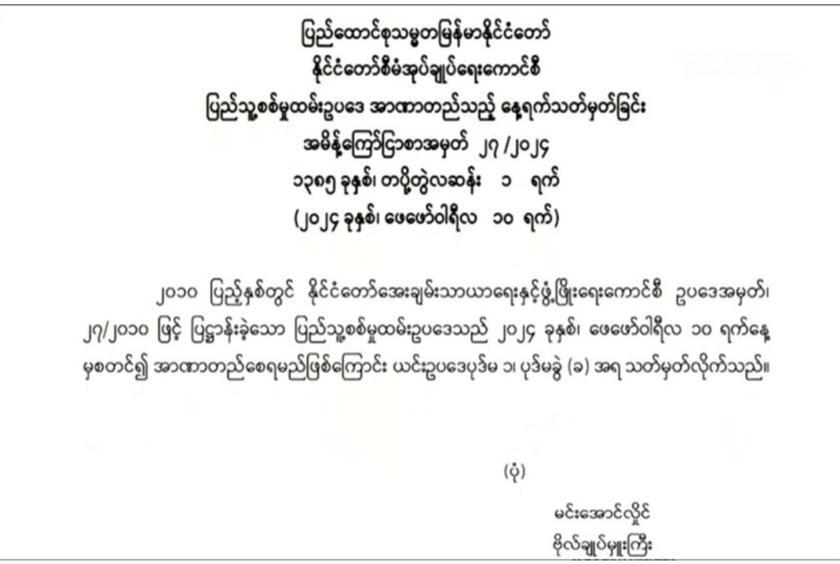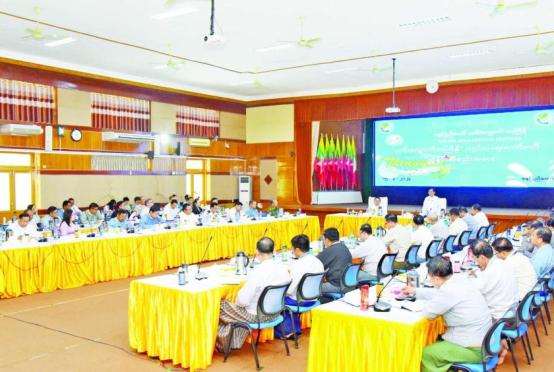The State Administration Council (SAC) has issued an order enforcing the People’s Military Service Law, which was originally enacted in 2010. According to the announcement No. 27/2024, this law will come into effect on February 10, 2024.
The Military Service Law, enacted on November 4, 2010, by the State Peace and Development Council Law No. 27/2010, is now in force. The Ministry of Defense will issue necessary regulations, procedures, orders, and instructions related to this law.
Article 385 of the Constitution emphasizes that protecting the independence, sovereignty, and territorial integrity of the Republic of Myanmar is the duty of every citizen. Similarly, Article 386 states that every citizen must undergo military education and serve in the military for national defense, as part of their responsibility. This commitment aligns with the preservation of the Three Main National Causes: Non-disintegration of the Union, Non-disintegration of national solidarity, and perpetuity of national sovereignty.
According to the military service law, militia service refers to citizens who serve in the military under this law. A person of military service age is defined as every citizen who has reached the age of 18 but has not yet reached the age of 35. For females, this includes citizens who have completed 18 years of age but have not yet reached 27 years. For male experts, it encompasses citizens who have reached 18 years but have not yet reached 45 years. Similarly, for female experts, it includes citizens who have reached 18 years but have not yet reached 35 years.
A military technician refers to individuals serving in the defense forces and those who are enlisted as technicians and technical experts according to the criteria set by the Defense Service Council. An expert, as defined by the law, includes medical doctors, engineers, technicians, or anyone practicing a specific form of expertise.
The Central Drafting Board, while inspecting appeal letters from Regional or State-level drafting boards for citizen military service, has the authority to temporarily postpone military service duty for those meeting the following criteria:
Those who fail to meet the medical fitness requirements for military service, as recommended by the military medical examination board. They shall include public servants, students, individuals caring for their helpless aged parents, those undergoing medical treatment for drug abuse termination and individuals who are imprisoned.
However, even after postponement, these individuals are still required to serve, even if their age exceeds the eligible age limit, as stipulated by the law.
According to the law, certain individuals are exempted from compulsory military service. These exemptions apply to such categories as members of religious orders, housewives, including women with children (even if they are divorced), people with permanent disabilities, individuals recognized as permanently inappropriate for military service by the military medical examination board, and those who receive an exemption by order from the Central Drafting Board.
However, if someone commits any of the following offenses in order to avoid military service and is found guilty, they can be punished with imprisonment of less than five years, a fine, or both: pretending to be ill or injured to degrade health standards, pretending to be disabled, inflicting injury on their own body or intentionally infecting themselves with a disease, intentionally prolonging illness or inflicting disability without proper medical care, voluntarily harming their own body and other methods used to evade military service.
If a public servant or a member of an organization, who is acting under this law, commits an offense with dishonest intention or fails to fulfill their duties, and is found guilty, the individual can be sentenced to imprisonment for less than three years, a fine, or both. Similarly, if someone assists in committing an offense that violates this law and is found guilty, the individual can be sentenced to imprisonment for less than a year, a fine, or both, as stipulated by the law.
















